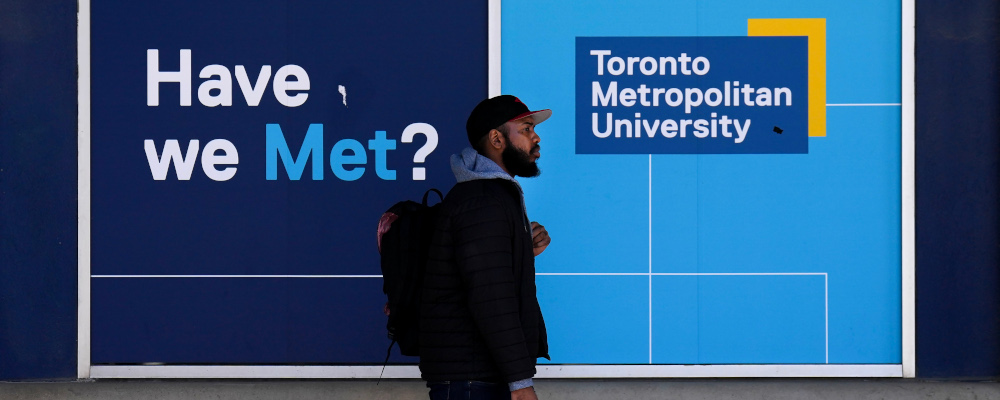It’s been an eventful week or so in the world of Canadian public policy and current affairs including the ongoing protests and rallies in response to the Israel-Hamas war, the Trudeau government’s intra-debate about its position on the war, and a growing scandal in Ontario over the Ford government’s greenbelt policy. The Hub’s editor-at-large Sean Speer weighs into these distinct issues below.
Canadian universities have lost their social license
The Canadian Left introduced the notion of “social licence” into our policy and political lexicon during the Harper era to describe the expectation that oil and gas companies act, consult, and operate in ways that secured public buy-in for individual projects and the sector as a whole.
Conservatives were mostly critical of the concept at the time. It seemed elusive, woolly, and conceived of to block projects rather than ultimately enable them. I’ve wondered in recent weeks, however, if in hindsight it has utility for thinking and talking about the place of institutions in a democratic society.
In particular, Canadian universities should ask themselves hard questions about their own social licence. The growing gap between the culture and ideas on campus and the rest of the population ought to be a major cause for concern. Universities’ alienation from the society in which they inhabit represents a threat to their social licence.
The shocking reaction of many university faculty members and students to Hamas’s terrorist attacks against Israel has exposed this gap for the rest of us to see. One gets the sense (as others such as Tyler Harper have noted) that the consequences will be lasting. The incentives for politicians to seriously take on universities have changed.
Academic freedom isn’t a get-out-of-jail-free card from democratic accountability—particularly in Canada where we still heavily rely on public dollars (even if the relative share has fallen) to finance universities. Scholars don’t have a positive right to publicly-subsidized employment or research funding. Universities don’t have a positive right to their current funding levels.
There’s nothing stopping provincial governments, for instance, from cutting core institutional funding (especially in a zero-sum world in which health care is consuming roughly half of program spending) or even reducing public subsidies for particular fields or disciplines (which might come in the form of policy reforms that require universities to charge the full cost of certain programs).
The upshot: if you’re a university president, you need to stop spending so much time and attention on managing your internal politics and start dedicating more to your external politics. Placating the most radical voices on your campus isn’t worth it if the cost is the public’s support for your institution’s basic mission. In fact, the opposite is true: a firm stand against radicalism is arguably the best means to protect your institution’s long-run interests.
What if there had never been a Ford government in Ontario?
A common criticism of the Harper government from the Right is that it didn’t do enough to advance proactive conservative reforms. It left too much of the liberal state and its underlying assumptions in place. The CBC is a prime example.
This critique is fair enough. It ultimately comes down to a debate about prudence, risk, and trade-offs.
It also neglects that successful centre-right governance is in large part the unseen. The stuff that would have otherwise happened if conservatives had not been in power. Counterfactuals are hard to prove, but it is fair to think that were it not for the Harper government, federal taxes as a share of GDP would have been higher, the fiscal response to the global financial crisis would have been larger and longer, and federal spending would be higher more generally, we would have had another top-down health accord with the provinces, a weaker foreign policy, and identity politics would have found earlier expression in federal policy.
Try the same counterfactual exercise for the Ford government. What would have changed if it hadn’t been elected in 2018? Not much I’d argue. Would Ontario’s fiscal position be much different? Maybe on the margins. Would the government have spent less on corporate subsidies? It’s hard to imagine. Would the government’s COVID response have been more restrictive? I doubt it. Would the province’s curriculum be more woke? I don’t know how. Would there be less progress on market-driven health-care reform? Maybe a bit. The list goes on.
The most damning critique of the Ford government from the Right isn’t that it hasn’t done enough to move the province in a conservative direction. It’s that the government’s record is by and large indistinguishable from what would have happened if it had never been elected.

Support for Israel should be a CPC requirement
The Liberal Party’s mix of free memberships, open nominations, and diaspora politics has enabled a small number of MPs and their supporters to essentially hijack the party’s principled position on the Middle East.
It’s a reminder that political parties shouldn’t be treated as mounds of clay that can be molded and remolded based on the passing preferences of one leader or well-organized yet non-representative political minorities.
Political parties should instead understand themselves as institutions with their own long-run interests and values that must transcend a single election cycle or single-issue campaign.
There’s a balancing act to be struck here. Parties don’t want to be dogmatic or static either. But the lesson of Donald Trump’s takeover of the Republican Party and the Liberal Party’s obfuscation on the Israel-Hamas war is that the current bias is tilted too far in the direction of weak parties.
There’s a strong case in my mind that political parties should insist that prospective candidates affirm statements of core principles and values. Such statements would have to be narrowly conceived so as to not significantly constrain intra-party debate about policy and priorities. But parties should be able to settle on their core principles and values that aren’t up for debate—even if there’s plenty of scope for debate on how to apply them to new and emerging issues.
For the Conservative Party, I’d argue that support for Israel ought to be among those core principles and values. That’s in large part because support for Israel is a good proxy for a set of principles and values—including a basic commitment to liberal democratic capitalism—that ought to define modern conservatism.
The Conservatives should seriously consider adopting such a statement as a condition for being a party candidate. It would be a key step towards strengthening their party as its own institution and protecting against the type of silent takeover that has befallen the Liberal Party.




